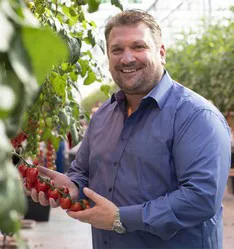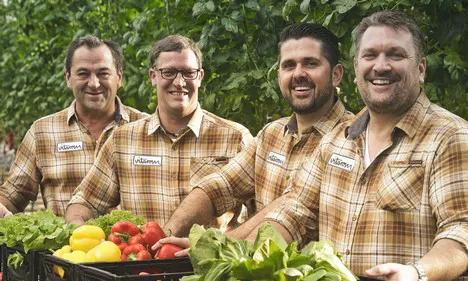The abundant  yields in spring, the disappointing fall production, and - last but not least - the energy crisis in the second half of the year: for Germany's greenhouse sector, 2022 was an eventful year overall. Carsten Knodt - vegetable producer in the Lower Rhine region and managing director (pictured right) of the Vitarom Group - describes the status quo as well as the future of German greenhouse production in this interview.
yields in spring, the disappointing fall production, and - last but not least - the energy crisis in the second half of the year: for Germany's greenhouse sector, 2022 was an eventful year overall. Carsten Knodt - vegetable producer in the Lower Rhine region and managing director (pictured right) of the Vitarom Group - describes the status quo as well as the future of German greenhouse production in this interview.
With a sunny spring, the omens of the past growing year were particularly good, Knodt says, looking back. "The early production into the summer was higher than in recent years due to above-average irradiation. In contrast, due to a lack of CO2, coupled with a prolonged period of heat, fall production was rather low. There was a so-called harvest hole from the end of September to the end of October, which completely canceled out the spring advantage. So the end result was that production was lower than in recent years."
Price concessions and production measures
According to Knodt, during the summer campaign, there was significant volume pressure, particularly regarding tomatoes, which affected selling prices. "This, in turn, has led to the increased promotional frequency at the POS. The remaining crops have performed well so far during the season, although the advertising frequency here was also significantly higher than in recent years, which is why price concessions inevitably had to be made."
Particularly during the second half of the year, the war-related energy crisis hovered over the vegetable growing sector like a sword of Damocles. High electricity and thermal energy prices forced growers to make adjustments in crop management and, overall, to become even more sustainable in their use of energy and other inputs in production, Knodt describes. "Our illuminated greenhouse (Vitarom Neurath GbR) has now been completely converted to fully dimmable white-red switchable LED lighting, as well as double energy screens and dehumidification via the 'Ventilation Jet' process. Even the highest effort in saving energy makes economic winter production impossible at current electricity prices."
In some cases, greenhouse operations without lighting are choosing a later planting date and ending the crop earlier to reduce heating energy consumption. Knodt: "Due to the current energy policy situation, it is not profitable at the moment to build a new
greenhouse production that is heated or lit with natural gas."
Reduced cultivation of fancy tomato varieties
The cost increases have also left deep marks on society and have already led to a reduction in purchasing power and corresponding changes in consumer behavior. "Consumers are increasingly looking to see where they can get the best price-performance ratio from their personal perception, coupled with regional and sustainable aspects. For the coming season, we have somewhat reduced the acreage of smaller, higher-quality tomatoes in favor of other items. However, we already expect that in the long term, higher-quality tomato varieties with added values will once again rise in favor with consumers."
Despite the current adversity, Knodt is looking ahead confidently. "The self-sufficiency level is not covered in the German greenhouse sector. Therefore, we continue to see long-term potential for fruit and vegetables from Germany. On the part of food retailers, demand for German produce continues to be targeted, which is why the range of German fruit vegetables has been steadily expanded across the assortment."

The management of Vitarom, a subsidiary of Landfrisch AG: Wilhelm Baum, Matthias Draek, Labinot Elshani, and Carsten Knodt.
Structural change ahead
According to Knodt, a structural change is also currently taking place in German greenhouse cultivation. "The average farm size will increase in the coming years. Cost pressures will inevitably mean that farm units will have to become larger in order to increase efficiency. The focus will continue to be on new, sustainable energy sources, and existing plants will be retrofitted to be more efficient according to the latest standards. In addition, automation and artificial intelligence (AI) will also be a rapidly evolving topic in greenhouse production over the next few years."
Visit the company at Fruit Logistica: Hall 20, A-15.
Images: Vitarom GmbH
For more information:
Landfrisch AG
Walter-Gropius-Straße 28
50126 Bergheim
Tel.: +49/2271/9955432
info@landfrisch.com
www.landfrisch.com
Carsten Knodt
Vitarom GmbH
Tel.: +49 2271 9955410
info@vitarom.de
www.vitarom.de
